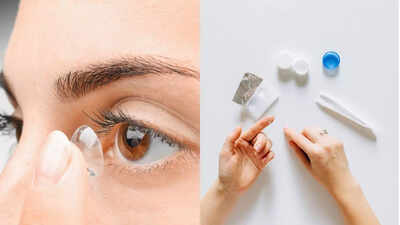Contact lenses are a popular choice for vision correction, providing convenience, clearer peripheral vision, and freedom from glasses. However, many wearers unintentionally put their eye health at risk by making common mistakes in lens use and care. According to a study published in PubMed, improper contact lens practices can lead to serious complications, including infections, corneal ulcers, and even permanent vision loss. Overwearing lenses, sleeping in them, poor hygiene, or using unsafe cleaning methods are among the most frequent errors. To protect your eyesight, it is crucial to follow professional advice, maintain strict hygiene, and replace lenses as recommended.
Avoid these everyday
1. Wearing contact lenses for too longOne of the most frequent errors is wearing lenses beyond their recommended time frame. Whether it’s daily, bi-weekly, or monthly disposables, every lens type comes with clear instructions. Yet, surveys reveal that nearly six in ten wearers admit to overusing lenses. Old or over-worn lenses not only become uncomfortable but also increase the chance of bacterial build-up, scratches, and infections.2. Sleeping in contact lensesUnless specifically prescribed as extended-wear lenses, sleeping in contact lenses is highly discouraged. During sleep, your eyes receive less oxygen, and the reduced tear exchange creates the perfect environment for bacteria to thrive. This can lead to microbial keratitis, a painful and potentially sight-threatening condition.3. Using the wrong cleaning practicesMany contact lens wearers cut corners when it comes to cleaning. Some even resort to rinsing lenses in tap water, saliva, or expired solution, all of which can introduce harmful microorganisms such as Acanthamoeba, a parasite that can cause severe corneal infections.4. Not washing and drying hands properlyTouching your lenses with dirty or wet hands can transfer germs directly into your eyes. Even clean water is not safe, it can contain microbes that thrive in the eye environment.5. Ignoring lens case hygieneA clean lens can still get contaminated if stored in a dirty case. Old solution, dust, and moisture can quickly become a breeding ground for bacteria. Studies recommend replacing cases every three months, even with regular cleaning.6. Buying cheap or inappropriate solutionsTrying to save money with off-brand or generic cleaning solutions might seem harmless, but not all are formulated to work with your lens material. Using the wrong solution can reduce disinfecting effectiveness and cause irritation.7. Wearing lenses in unsafe conditionsDry environments, such as high-altitude locations or heated indoor spaces, can cause discomfort and reduced oxygen to the eye. Similarly, swimming or showering with lenses on increases the risk of infections, as water often contains harmful microorganisms.Also read | Dandruff or Scalp Psoriasis? Spot the signs, understand causes, and tips to manage effectively











